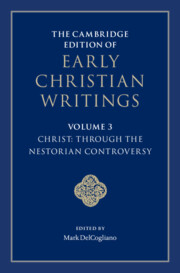Book contents
- The Cambridge Edition of Early Christian Writings
- The Cambridge Edition of Early Christian Writings
- The Cambridge Edition of Early Christian Writings
- Copyright page
- Contents
- Notes on Contributors
- Acknowledgments
- Note on the Texts and Translations
- Abbreviations
- Series Introduction
- Introduction
- Part I The Beginnings of Christology
- Part II Developing Christological Traditions
- 13 Tertullian, Apology 21
- 14 Tertullian, On the Flesh of Christ 1–16 and 24–25
- 15 Tertullian, Against Praxeas 1–4 and 27–30
- 16 Origen, On First Principles 2.6
- 17 Paul of Samosata, Selected Fragments
- 18 Aphrahat, Demonstration 17: On the Son
- 19 Hilary of Poitiers, On the Trinity 9.1–14
- 20 Ephrem the Syrian, Hymns on Faith 4, 10, 24, 31, 36, 51, 54, 77, 78, and 79
- Part III Traditions of Pro-Nicene Christology
- Part IV Controversy over Nestorius
- Suggestions for Further Reading
- Scriptural Index
19 - Hilary of Poitiers, On the Trinity 9.1–14
from Part II - Developing Christological Traditions
Published online by Cambridge University Press: 05 February 2022
- The Cambridge Edition of Early Christian Writings
- The Cambridge Edition of Early Christian Writings
- The Cambridge Edition of Early Christian Writings
- Copyright page
- Contents
- Notes on Contributors
- Acknowledgments
- Note on the Texts and Translations
- Abbreviations
- Series Introduction
- Introduction
- Part I The Beginnings of Christology
- Part II Developing Christological Traditions
- 13 Tertullian, Apology 21
- 14 Tertullian, On the Flesh of Christ 1–16 and 24–25
- 15 Tertullian, Against Praxeas 1–4 and 27–30
- 16 Origen, On First Principles 2.6
- 17 Paul of Samosata, Selected Fragments
- 18 Aphrahat, Demonstration 17: On the Son
- 19 Hilary of Poitiers, On the Trinity 9.1–14
- 20 Ephrem the Syrian, Hymns on Faith 4, 10, 24, 31, 36, 51, 54, 77, 78, and 79
- Part III Traditions of Pro-Nicene Christology
- Part IV Controversy over Nestorius
- Suggestions for Further Reading
- Scriptural Index
Summary
Hilary of Poitiers was one of the premier theologians of the Latin West in the fourth century, along with Ambrose of Milan and Augustine of Hippo. In 356 he was banished at a synod at Béziers for his support of Athanasius and the Alexandrian bishop’s “anti-Arian” program, and exiled to Asia Minor for four years. Here Hilary became far more knowledgeable about the theological debates rocking the church, and his own theology was decisively shaped by the encounter. He was particularly influenced by the Homoiousian theology of Basil of Ancyra. Hilary attended the Council of Seleucia in 359, which promulgated a broadly Homoian creed that was given official approval, under the auspices of Emperor Constantius, at Constantinople in January 360. During his exile in the East he penned a number of theological works, including On the Trinity, against Homoian theology. Shortly after the synod in Constantinople he returned to his homeland, where he worked against those who supported Homoian theology. He died in 367 or 368.
- Type
- Chapter
- Information
- The Cambridge Edition of Early Christian Writings , pp. 222 - 234Publisher: Cambridge University PressPrint publication year: 2022

